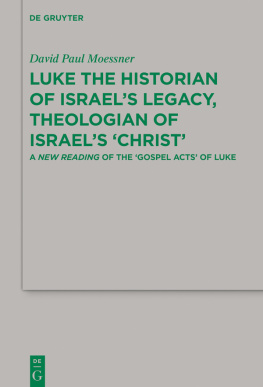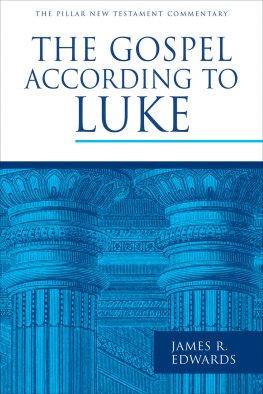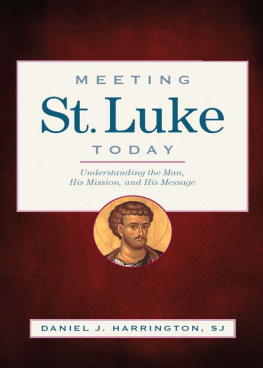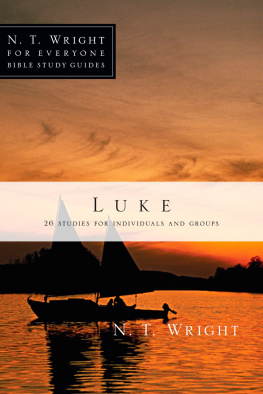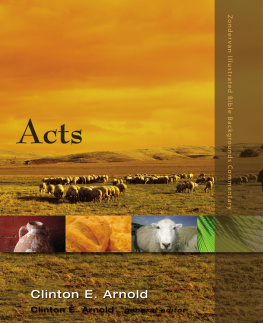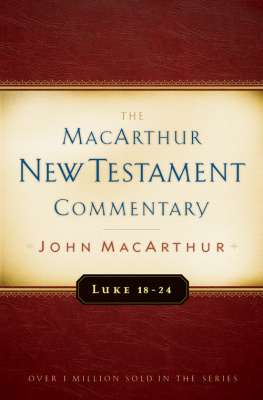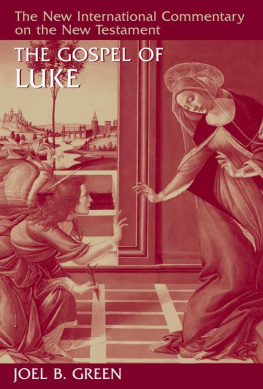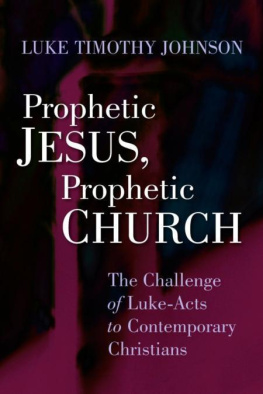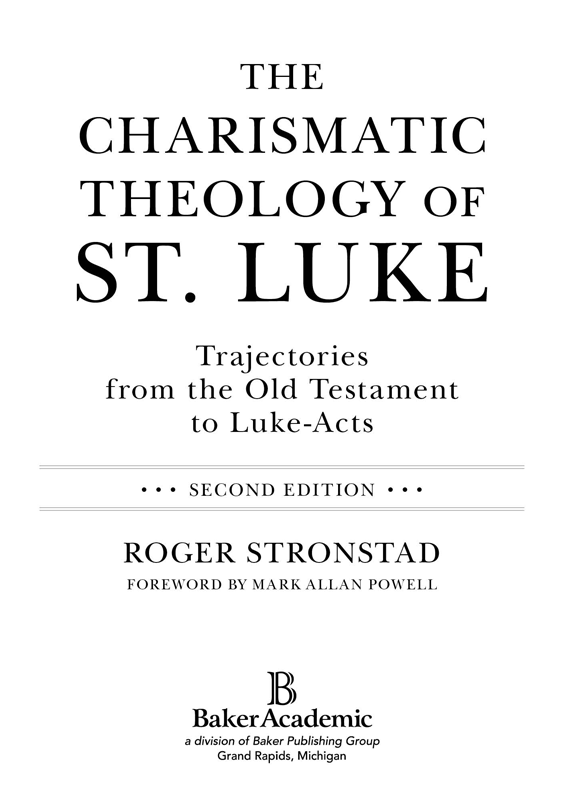
1984, 2012 by Roger Stronstad
Published by Baker Academic
a division of Baker Publishing Group
P.O. Box 6287, Grand Rapids, MI 49516-6287
www.bakeracademic.com
Ebook edition created 2012
All rights reserved. No part of this publication may be reproduced, stored in a retrieval system, or transmitted in any form or by any meansfor example, electronic, photocopy, recordingwithout the prior written permission of the publisher. The only exception is brief quotations in printed reviews.
ISBN 978-1-4412-4033-0
Library of Congress Cataloging-in-Publication Data is on file at the Library of Congress, Washington, DC.
Unless otherwise indicated, Scripture quotations are from the New American Standard Bible, copyright 1960, 1962, 1963, 1968, 1971, 1972, 1973, 1975, 1977, 1995 by The Lockman Foundation. Used by permission.
Scripture quotations labeled KJV are from the King James Version of the Bible.
Scripture quotations labeled NIV are from the Holy Bible, New International Version. NIV. Copyright 1973, 1978, 1984, 2011 by Biblica, Inc. Used by permission of Zondervan. All rights reserved worldwide. www.zondervan.com
Scripture quotations labeled NRSV are from the New Revised Standard Version of the Bible, copyright 1989, by the Division of Christian Education of the National Council of the Churches of Christ in the United States of America. Used by permission. All rights reserved.
The internet addresses, email addresses, and phone numbers in this book are accurate at the time of publication. They are provided as a resource. Baker Publishing Group does not endorse them or vouch for their content or permanence.
To Clifford and Dawn Stronstad
and Amy and Jody,
and to Irene and Robert Jonas
and Jennifer, Pamela, and Jeramy,
with affection.
Contents
Foreword by Mark Allan Powell
Preface to the Second Edition
Acknowledgments
1. The Holy Spirit in Luke-Acts: A Challenge in Methodology
2. The Holy Spirit in the Old Testament: The Charismatic Spirit of God
3. The Holy Spirit in the Gospel of Luke: The Charismatic Christ
4. The Holy Spirit at Pentecost: The Charismatic Community
5. The Holy Spirit in the Acts of the Apostles: The Charismatic Community in Mission
6. The Charismatic Theology of Luke: Synthesis and Challenge
Notes
Further Reading
Scripture Index
Subject Index
Foreword
I n my college years, I had a number of charismatic experiences and for quite some time I spoke in tongues every day. I had visions; I believed God was leading me and guiding me in remarkably detailed ways; I experienced divine empowerment to accomplish things I never could have done otherwise. The book of Acts seemed to me to be the most relevant and realistic book in the Bible.
By the time I entered doctoral school fifteen years later (198487), my theological vision had shifted. Though I have never liked categories, I probably would have identified myself as an evangelical while everyone else would have called me a mainline Lutheran. The words charismatic and Pentecostal would not have come up.
In my doctoral program, I read numerous scholarly and academic works on Lukes gospel and the book of Acts; eventually, I would even publish two books on Lukan scholarship: What Are They Saying about Luke? (Paulist, 1989) and What Are They Saying about Acts? (Paulist, 1991). Throughout those studies, I could not help but notice that most scholars regarded the charismatic aspect of Lukan theology as an oddity. For most authors, Lukes description of the various ways in which the Spirit of God directed and empowered people lacked credibility as straightforward history. For some, this meant that Lukes reporting was simply too infected by primitive superstition to be taken seriously; for others, it only meant that Luke needed to be granted an extraordinary degree of literary license. Further, even those scholars who did grant that Luke was reporting what had actually occurred usually took his accounts as descriptive of a bygone era, the passing of which they did not much regret: the book of Acts describes things as they were , not as they are , nor as they should be, nor (truth be told) as we would want them to be. Thus scholars dealt with the charismatic aspect of Lukes theology in diverse ways, but everyone seemed to agree it was a problem.
I am not saying that any of these scholars were wrong. I simply note that they did not regard the book of Acts as realistic or relevant. Perhaps, I thought, this is appropriate: these are scholars studying ancient literature. Scholars typically approach such works with a degree of critical distance, recognizing for instance that first-century authors (and readers) espoused a worldview different from our own. But in this case the critical distance seemed extreme: most New Testament scholars seemed to think that the book of Acts was actually kind of weird. So, even when I was convinced that a scholar was correct or insightful in his or her observations, I often felt like I was reading the comments of someone on the outside looking in.
When I read Roger Stronstads The Charismatic Theology of St. Luke , I knew that I had found something different: the very tone of the book was at that time unique in Lukan studies. Stronstad not only found the charismatic elements of Lukes theology to be credible; he also found them appealing . Stronstad too writes as a scholar; his primary goal is elucidation, not edification, and he knows he is dealing with ancient literature for which meaning is not always transparent or application obvious. Yet he also writes unapologetically as a pentecostal scholar, as someone who does regard even the strangest aspects of Lukes books to be both relevant and realistic. He does not simply prize those aspects of Lukes writings as depictions of some quaint form of first-century piety, or even as descriptions of how things once were in some safely defined previous dispensation. Stronstad does seek to elucidate Lukes understanding of the Spirit as might any biblical scholar, but he does so as a scholar who actually believes Lukes understanding of spiritual guidance and empowerment remains credible and commendable for contemporary theology and mission.
In noting this, again, I certainly do not mean to disparage the value of more detached, external perspectives: there is absolutely nothing wrong with scholarship produced by outsiders looking in. We all do that kind of research sometimes, and, indeed, there are instances in which such detachment is to be preferred. But let us grant that something is missing. If I were so inclined, I expect that I could research and write a pretty good book on the writings of some hermit monk who lived in isolation for most of his life. But no matter how much I admired such an individual, I would regard him as someone who lived his life in a way that I would never want to live mine. My observations might be accurate and even insightful, but my volume would not be the same sort of book as might be produced by a competent scholar who lived in isolation himself and who commended such an existence for others.
Stronstads scholarship has merit on its own terms, and his understanding of the Spirit in Luke-Acts warrants comparison with that of James D. G. Dunn, Jacob Jervell, and many other modern interpreters. His particular contributions include (1) an emphasis on Lukes reliance on the Hebrew tradition, as opposed to conceptions of spirit in Greek thought; (2) an exposition of Lukes transformation of that tradition in ways that testify to new developments; and (3) delineation of significant elements in Lukes perspective that set his theology apart from that of other biblical writers (including Paul) in distinctive but not necessarily contradictory ways. These points, of course, are arguable, and the crucible of scholarship will ensure that they continue to be argued. Stronstads positions have at least become established as one of the primary options: his arguments are now regarded as defensible by all, and as persuasive by many.


